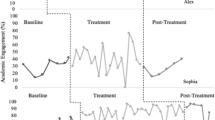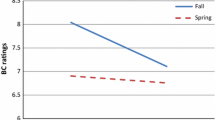Abstract
Intervention researchers have often failed to assess treatment integrity; when integrity is examined, the focus is typically on whether the steps of intervention have been applied and not on quality of implementation. In the few studies that have investigated intervention quality, the emphasis has been on how intervention is delivered and not how it is received or the degree of participant engagement. This study was designed to examine participant engagement, specifically teacher investment, in the context of family interventions for children with attention-deficit/hyperactivity disorder (ADHD) that were linked with the school. The interventions included Family–School Success (FSS), a program that engages families and schools in a problem solving partnership, and Coping with ADHD through Relationships and Education (CARE), a program designed to provide education and support to families. Participants included the families and teachers of children in grades 2 through 6; 45 sets of families and teachers participated in FSS and 48 were in CARE. The Teacher Investment Questionnaire (TIQ) was designed to assess teacher engagement in intervention. The TIQ is a rating scale for clinicians to be completed during and after treatment. The findings provided support for the reliability and validity of the TIQ. Level of teacher involvement was demonstrated to decline with advancing grade level for FSS, but not CARE. Parent ratings of the quality of the family–school relationship as well as the level of teacher support for homework, assessed at baseline, were shown to be significantly related to clinician ratings of teacher investment post-intervention. The findings highlight the importance of assessing participant engagement in intervention. Strategies to refine the assessment of teacher investment were discussed.

Similar content being viewed by others
References
Ambrosini, P. J. (2000). Historical development and present status of the Schedule for Affective Disorders and Schizophrenia for School-Age Children (K-SADS). Journal of the American Academy of Child and Adolescent Psychiatry, 39, 49–58.
Anesko, K. M., Schoiock, G., Ramirez, R., & Levine, F. M. (1987). The Homework Problem Checklist: Assessing children’s homework difficulties. Behavioral Assessment, 9, 179–185.
Armbruster, P., & Kazdin, A. E. (1994). Attrition in child psychotherapy. Advances in Clinical Child Psychology, 16, 81–89.
Bergeron, R., Floyd, R. G., McCormack, A. C., & Farmer, W. L. (2008). The generalizability of externalizing behavior composites and subscale scores across time, rater, and instrument. School Psychology Review, 37, 91–108.
Biggs, B. K., Vernberg, E. M., Twemlow, S. W., Fonagy, P., & Dill, E. J. (2008). Teacher adherence and its relation to teacher attitudes and student outcomes in an elementary school-based violence prevention program. School Psychology Review, 37.
Bussing, R., Fernandez, M., Harwood, M., Hou, W., Garvan, C. W., Eyberg, S. M., et al. (2008). Parent and teacher SNAP-IV ratings of attention deficit hyperactivity disorder symptoms. Assessment, 15, 317–328.
Christenson, S. L., & Sheridan, S. M. (Eds.). (2001). Schools and families: Creating essential connections for learning. New York: Guilford Press.
Dane, A. V., & Schneider, B. H. (1998). Program integrity in primary and early secondary prevention: Are implementation effects out of control? Clinical Psychology Review, 18, 23–45.
DuPaul, G. J., Power, T. J., Anastopoulos, A. D., & Reid, R. (1998). ADHD Rating Scale-IV: Checklists, norms and clinical interpretation. New York: The Guilford Press.
Epstein, J. L. (1995). School/family/community partnership: Caring for the children we share. Phi Delta Kappan, 76, 701–712.
Fantuzzo, J. F., Tighe, E., & Childs, S. (2000). Family Involvement Questionnaire: A multivariate assessment of family participation in early childhood education. Journal of Educational Psychology, 92, 367–376.
Henggeler, S. W., Melton, G. B., Brondino, M. J., Scherer, D. G., & Hanley, J. H. (1997). Multisystemic therapy with violent and chronic juvenile offenders and their families: The role of treatment fidelity in successful dissemination. Journal of Consulting and Clinical Psychology, 65, 821–833.
Hirschstein, M. K., Van Schoiack Edstrom, L., Frey, K. S., Snell, J. L., & MacKenzie, E. P. (2007). Walking the talk in bullying prevention: Teacher implementation variables related to initial impact of the Steps to Respect program. School Psychology Review, 36, 3–21.
Hollingshead, A. B. (Ed.). (1975). Four-factor index of social status. New Haven, CT: Yale University Department of Sociology.
Hughes, J. N., Cavell, T. A., Meehan, B. T., Zhang, D., & Collie, C. (2005). Adverse school context moderates the outcomes of selective interventions for aggressive children. Journal of Consulting and Clinical Psychology, 73, 731–736.
Kahle, A. L., & Kelley, M. L. (1994). Children’s homework problems: A comparison of goal setting and parent training. Behavior Therapy, 25, 275–290.
Kelly, M. L., & McCain, A. P. (1995). Promoting academic performance in inattentive children: The relative efficacy of school-home notes with and without response cost. Behavior Modification, 19, 357–375.
Kohl, G. O., Lenqua, L. J., McMahon, R. J., & Conduct Problems Prevention Research Group. (2000). Parent involvement in school: Conceptualizing multiple dimensions and their relations with family demographic risk factors. Journal of School Psychology, 38, 501–524.
Manz, P. H., Fantuzzo, J. W., & Power, T. J. (2004). Multidimensional assessment of family involvement among urban elementary students. Journal of School Psychology, 42, 461–475.
McWilliam, R. A., Maxwell, K. L., & Sloper, K. M. (1999). Beyond “involvement”: Are elementary schools ready to be family-centered? School Psychology Review, 28, 378–394.
Noell, G. H., Gresham, F. M., & Gansle, K. A. (2002). Does treatment integrity matter? A preliminary investigation of instructional implementation and mathematics performance. Journal of Behavioral Education, 11, 51–67.
Noell, G. H., Witt, J. C., Slider, N. J., Connell, J. E., Gatti, S. L., Kashunda, K. L., et al. (2005). Treatment implementation following behavioral consultation in schools: A comparison of three follow-up strategies. School Psychology Review, 34, 87–106.
Pelham, W. E., & Fabiano, G. A. (2008). Evidenced-based psychological treatments for attention-deficit/hyperactivity disorder. Journal of Clinical Child & Adolescent Psychology, 37, 184–214.
Power, J. T., Blom-Hoffman, J., Clarke, A. T., Riley-Tilman, T. C., Kelleher, C., & Manz, P. H. (2005). Reconceptualizing intervention integrity: A partnership-based framework for linking research with practice. Psychology in the Schools, 42, 495–507.
Power, T. J., Dombrowski, S. C., Watkins, M. W., Mautone, J. A., & Eagle, J. W. (2007). Assessing children’s homework performance: Development of multi-dimensional, multi-informant rating scales. Journal of School Psychology, 45, 333–348.
Power, T. J., Karustis, J. L., & Habboushe, D. F. (2001). Homework success for children with ADHD: A family-school intervention program. New York: Guilford Press.
Power, T. J., & Mautone, J. A. (2008). Best practices in linking families and schools to educate children with attention problems. In A. Thomas & J. Grimes (Eds.), Best practices in school psychology V. Bethesda, MD: National Association of School Psychologists.
Power, T. J., Soffer, S. L., Clarke, A. T., & Mautone, J. A. (2006). Multisystemic intervention for children with ADHD. Report on Emotional and Behavioral Disorders in Youth, 6(3), 51–52, 67–69.
Psychological Corporation. (1999). Wechsler Abbreviated Scale of Intelligence (WASI). San Antonio, TX: Author.
Reynolds, C. R., & Kamphaus, R. W. (2004). Behavior assessment system for children, second edition (BASC-2). Circle Pines, MN: AGS Publishing.
Rimm-Kaufman, S. E., & Pianta, R. C. (1999). Patterns of family-school contact in preschool and kindergarten. School Psychology Review, 28, 426–438.
Sheridan, S. M., & Kratochwill, T. R. (Eds.). (2008). Conjoint behavioral consultation: Promoting family-school connections and interventions. New York: Springer.
Swanson, J. M., Kraemer, H. C., Hinshaw, S. P., Arnold, L. E., Conners, C. K., Abikoff, H. B., et al. (2001). Clinical relevance of the primary findings of the MTA: Success rates based on severity of ADHD and ODD symptoms at the end of treatment. Journal of the American Academy of Child and Adolescent Psychiatry, 40, 168–179.
Thomas, D. E., Bierman, K. L., & The Conduct Problems Prevention Research Group. (2006). The impact of classroom aggression on the development of aggressive behavior in children. Development and Psychopathology, 18, 731–736.
Waltz, J., Addis, M. E., Koerner, K., & Jacobson, N. S. (1993). Testing the integrity of a psychotherapy protocol: Assessment of adherence and competence. Journal of Consulting and Clinical Psychology, 61, 620–630.
Acknowledgment
This project was supported by NIH research grant R01 MH068290-05 funded by the National Institute of Mental Health and the Department of Education.
Author information
Authors and Affiliations
Corresponding author
Rights and permissions
About this article
Cite this article
Power, T.J., Soffer, S.L., Mautone, J.A. et al. An Analysis of Teacher Investment in the Context of a Family–School Intervention for Children with ADHD. School Mental Health 1, 107–117 (2009). https://doi.org/10.1007/s12310-009-9005-x
Published:
Issue Date:
DOI: https://doi.org/10.1007/s12310-009-9005-x




